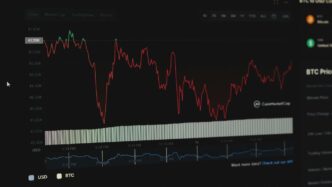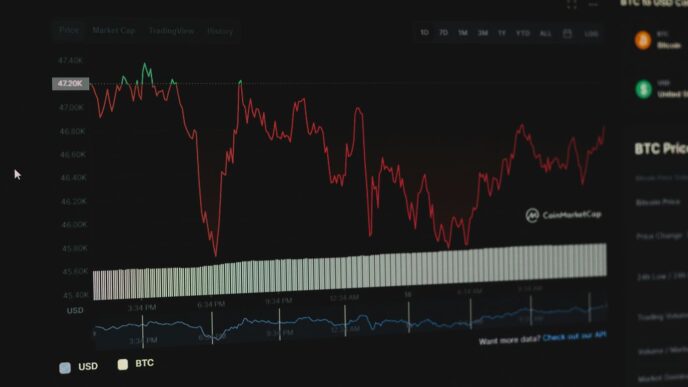Thinking about where to put your money in 2025? The world needs to eat, and that means farming is always going to be important. Investing in farmer stocks might seem a bit different, but it’s really about putting your money into companies that help grow our food, manage the land, or make the equipment farmers use. It’s a sector that’s always changing, especially with new technology and the need for more sustainable practices. Let’s check out some of the farmer stocks that could be worth watching.
Key Takeaways
- Farmland REITs offer a way to invest in land itself, often providing steady income through rent and potential for land value growth. They’ve shown good returns in the past.
- ETFs focused on agriculture or farmland can spread your investment across many companies, reducing risk compared to picking just one or two stocks.
- Major companies like Deere and AGCO are key players in farm equipment, benefiting from the push for modern, efficient farming methods.
- Input providers such as Corteva, Nutrien, and Mosaic are vital for crop health and yield, making them important parts of the agricultural chain.
- Commodity traders and processors like Archer Daniels Midland and Bunge Limited are closely tied to the success of global agriculture and food supply.
1. Farmland REIT Stocks

When we talk about investing in farmland, one of the easiest ways for most people to get involved is through Real Estate Investment Trusts, or REITs. Think of a farmland REIT as a company that owns and operates a bunch of farms. They buy land, manage it, and then rent it out to actual farmers. The cool thing is, they have to pay out most of their profits to shareholders as dividends, which can be a nice steady income stream.
Farmland REITs offer a way to invest in a tangible asset that’s pretty fundamental to, well, everything – feeding people. It’s not like investing in a tech company where the value is based on future potential; this is about land that grows crops, fiber, and even resources for renewable energy. Historically, land values tend to go up when inflation does, so it can be a good way to protect your money from losing its buying power. Plus, farmland doesn’t usually move in the same direction as the stock market, so it can help balance out your overall investments.
Here are a few key players to keep an eye on:
- Farmland Partners Inc. (NYSE: FPI): This is one of the biggest publicly traded farmland REITs in the US. They own land across different agricultural states and grow a variety of crops like corn, soybeans, and cotton. They’re also looking into things like regenerative farming practices, which is pretty interesting.
- Gladstone Land Corporation (NASDAQ: LAND): Gladstone focuses more on land for organic and specialty crops. With more people wanting healthier food, this could be a smart move. They often sign long-term leases, which helps keep their income predictable.
- American Farmland Company: While this one is privately held, it’s worth noting their focus on soil regeneration projects in the Midwest. It shows how some companies are thinking about the long-term health of the land itself.
These REITs handle all the nitty-gritty details of owning and managing farmland, like finding tenants and dealing with upkeep. For investors, it means you can get exposure to agriculture without having to worry about the day-to-day operations. It’s a pretty straightforward way to put your money into something that’s always going to be needed.
2. Farmland Stocks ETF
For investors looking to get a piece of the agriculture pie without picking individual farms or companies, Exchange Traded Funds (ETFs) that focus on farmland and agribusiness are a pretty neat option. Think of them as a basket holding a bunch of different agriculture-related investments. This can include everything from the actual land owners (like some REITs we talked about) to companies that make tractors, fertilizer, or even process food. It’s a way to spread your risk around.
While there aren’t a ton of ETFs that only hold farmland, many agriculture-focused ETFs will include farmland REITs alongside other agribusiness players. This gives you a broader exposure to the whole sector. These ETFs can be a good way to get diversified exposure to global agriculture markets, spreading risk across different regions, types of companies, and even farming practices. They trade just like regular stocks, so they’re pretty easy to buy and sell on most trading platforms, often with lower fees than buying individual stocks.
Here’s a quick look at what you might find in some of these ETFs:
- Equipment Manufacturers: Companies that build the big machines farmers use.
- Input Suppliers: Businesses that produce seeds, fertilizers, and crop protection products.
- Food Processors & Distributors: Companies that handle the food after it’s harvested.
- Farmland REITs: Real Estate Investment Trusts that own and lease farmland.
When you invest in an ETF, you’re essentially buying a small piece of all the companies or assets held within that fund. This diversification can help smooth out the bumps that come with investing in a single company or even a single type of agricultural asset. Plus, many ETFs pay out dividends, which can add a nice income stream to your investment.
3. Deere & Company
When you think about farming, especially big-time farming, you probably picture tractors and combines. And that’s where Deere & Company, or simply John Deere, comes in. They’re a giant in making the equipment that farmers use every single day to get their crops in and out of the ground.
Deere is a major player in agricultural machinery, and their tech is getting pretty advanced. They don’t just make tractors anymore; they’re really pushing into what they call ‘precision agriculture.’ This means using GPS, sensors, and data to help farmers plant, fertilize, and harvest more efficiently. Think of it like giving farmers a super-smart assistant for their fields.
Their business is split into a few main parts:
- Production and Precision Agriculture: This is the big stuff – the large tractors, combines, and all the fancy tech that goes with them for planting and harvesting. They’re focused on making these machines smarter and more productive.
- Small Agriculture and Turf: This covers smaller tractors, mowers, and equipment for smaller farms, landscaping, and even home use. It’s a different market but still important.
- Construction and Forestry: Believe it or not, they also make equipment for building roads and logging. It shows how versatile their engineering is.
- Financial Services: They help farmers and others finance the purchase of all this expensive equipment. It’s a big part of their overall business.
Looking ahead to 2025, Deere is well-positioned because farming is always going to be around, and farmers need reliable, modern equipment. Plus, with the push for more sustainable and efficient farming practices, their investment in technology like autonomous tractors and data analytics could really pay off. They’re not just selling machines; they’re selling solutions to help farmers make more money and use their land better. It’s a solid bet for anyone looking at the future of agriculture.
4. AGCO Corporation
AGCO Corporation is a big name in farm equipment. They make tractors, combines, and all sorts of other machines that farmers use to get their work done. Think of them as the folks providing the tools for modern agriculture.
AGCO operates in a few different areas, but their main focus is on equipment for large farms and for smaller plots of land, plus stuff for turf management. They also have a segment for construction and forestry equipment, which is a bit different but still uses their manufacturing know-how. Their business really ties into how much farmers are investing in new technology to be more efficient.
Here’s a quick look at how they’ve been doing:
- Product Lines: They offer a wide range of machinery, from massive combines that harvest crops to precision planters that put seeds in the ground just right. They also make sprayers and other equipment for managing crops throughout the growing season.
- Market Position: AGCO is a significant player in the global agricultural equipment market. They compete with other major manufacturers, and their success often depends on the overall health of the farming economy and the adoption of new farming techniques.
- Future Outlook: With the push for more sustainable farming and the need to produce more food for a growing population, companies like AGCO that provide advanced equipment are likely to stay relevant. Farmers are always looking for ways to do more with less, and AGCO’s technology aims to help with that.
5. Corteva
Corteva, Inc. is a big player in the agriculture world, focusing on two main areas: seeds and crop protection. Think of them as providing the building blocks and the shields for farmers’ crops. They develop and sell things like seeds that are designed to grow better and resist pests, and also the chemicals that protect those crops from weeds, insects, and diseases.
Their work directly impacts how much food farmers can grow and how efficiently they can do it. This makes them a pretty important company in the whole food production chain.
Corteva operates globally, meaning they’re involved in farming practices and challenges all over the world. This broad reach gives them a unique perspective on different agricultural needs and trends.
Here’s a quick look at some of their business aspects:
- Seed Business: This involves developing and selling a variety of seeds, often with traits that improve yield or resilience.
- Crop Protection: This segment focuses on herbicides, insecticides, and fungicides to keep crops healthy and productive.
- Global Operations: They serve farmers in numerous countries, adapting their products to local conditions.
When you look at Corteva, you’re looking at a company that’s deeply involved in the day-to-day realities of farming, trying to help farmers get the most out of their land.
6. Nutrien Ltd.
Nutrien Ltd. is a pretty big deal in the agricultural world, and honestly, their recent numbers show they’re not just sitting back.
This company is a major player when it comes to crop inputs and services. Think fertilizers like potash, nitrogen, and phosphate, but also seeds and crop protection stuff. They’ve got this huge network of retail locations, over 2,000 of them, spread across Canada, the US, South America, and even Australia. They’re also one of the biggest potash producers globally, and they’ve been doing pretty well selling their products online.
Nutrien is aiming to boost its potash production to 18 million tonnes by 2025 to keep up with demand.
Now, it hasn’t all been smooth sailing. In 2024, they faced some financial bumps. For the first nine months, net earnings were around $582 million, and adjusted EBITDA was $4.3 billion. The third quarter of 2024 saw net earnings drop to $25 million, way down from $82 million the year before. This was mostly because crop prices fell, leading farmers to spend less on fertilizer. Still, they’re the world’s largest fertilizer producer and offer a dividend yield of about 4.2%, which is nice for investors looking for a bit of steady income.
Here’s a quick look at some of their financials:
| Metric | Latest Reported |
|---|---|
| Trailing Revenue | $25.6 billion |
| Operating Cash Flow | $4.6 billion |
| Forward P/E Ratio | 11.8 |
| Dividend Yield | ~4.2% |
Despite the recent dips, the market seems to think Nutrien has good growth prospects ahead. With global food demand still rising and challenges like climate change impacting farming, companies like Nutrien, which provide essential inputs, are pretty important.
7. The Mosaic Company

The Mosaic Company is a big player when it comes to fertilizers, specifically potash and phosphate. Think of them as a key supplier for farmers looking to boost their crop yields. They mine and process these essential nutrients, which are pretty vital for growing food.
Mosaic’s business is pretty straightforward: they dig up raw materials and turn them into fertilizers that farmers need. It’s a cyclical business, often tied to crop prices and global demand for food. When farmers are doing well and prices are high, they tend to spend more on fertilizers, which is good for Mosaic.
Here’s a quick look at what they do:
- Potash: This is a key ingredient for plant growth, helping with things like water retention and nutrient uptake. Mosaic is one of the world’s largest producers.
- Phosphate: Another crucial nutrient, phosphate helps with root development and flowering. Mosaic mines and processes phosphate rock to create fertilizer.
- Crop Nutrition: Beyond just the raw materials, they also offer finished fertilizer products and services aimed at helping farmers use them effectively.
Looking ahead to 2025, Mosaic’s performance will likely depend on global agricultural trends, commodity prices, and their ability to manage production costs. They’ve been working on improving their operational efficiency, which could help them through any tougher market conditions. It’s worth keeping an eye on how they handle supply chain issues and any shifts in farming practices that might affect fertilizer demand.
8. Archer Daniels Midland
Archer Daniels Midland, often just called ADM, is a big player in the whole food and agriculture scene. They’re basically involved in almost every step of getting food from the farm to your table. Think about it: they buy crops from farmers, store them, move them around, and then process them into all sorts of ingredients and products. It’s a pretty massive operation.
ADM works in a few main areas. There’s the Ag Services and Oilseeds part, where they handle things like soybeans and other oil-producing crops. Then they have Carbohydrate Solutions, which is all about sweeteners and starches. And finally, the Nutrition segment is growing, focusing on healthier ingredients. This broad reach means ADM is pretty much tied to the health of the entire agricultural economy.
Looking ahead to 2025, ADM’s performance will likely depend on a few things:
- Global Crop Yields: How much food is actually grown around the world directly impacts ADM’s supply.
- Commodity Prices: The prices of crops like corn and soybeans fluctuate, and ADM makes money by trading and processing them.
- Demand for Ingredients: As consumers look for more plant-based options and healthier foods, ADM’s nutrition segment could see more growth.
It’s not always a smooth ride, though. Commodity markets can be volatile, and weather events can really mess with crop production. But ADM has been around for a long time, and they’ve gotten pretty good at managing these ups and downs. They’re a company to keep an eye on if you’re interested in the bigger picture of where our food comes from and how it gets to us.
9. Bunge Limited
Bunge Global SA is a big player in the agribusiness and food world. They’re involved in a bunch of different areas, like buying, storing, moving, and selling farm products. Think soybeans, corn, wheat – the whole lot. They also process these things into oils and meals.
Bunge’s business is split into four main parts:
- Agribusiness: This is where they handle the raw commodities, from buying them to selling them. It’s the core of their operations.
- Refined and Specialty Oils: They take those raw ingredients and turn them into oils used in food and other products.
- Milling: This segment focuses on processing grains into things like flour.
- Sugar and Bioenergy: Bunge also has a hand in producing sugar and biofuels.
It’s a pretty diverse setup, which can help them weather different market conditions. They’re a global company, so they’re dealing with agricultural supply chains all over the planet. For 2025, keeping an eye on how they manage global commodity prices and supply chain disruptions will be key. Their performance is tied to how well they can source, process, and distribute these essential goods.
10. Ag Growth International
Ag Growth International (AGI) is a company that engineers and manufactures equipment for handling and storing grain. Think of them as the folks who build the essential machinery that keeps crops moving from the field to where they need to go. They’re involved in everything from loading and unloading to processing and storing.
Their business is pretty straightforward: they make the tools farmers and agricultural businesses need to manage their harvests efficiently. This is a big deal because as the world population keeps growing, so does the need for effective food production and distribution. AGI’s equipment plays a key role in making sure that food doesn’t go to waste and can get to consumers.
Here’s a quick look at some of their key areas:
- Grain Handling: This includes equipment like conveyors, augers, and bucket elevators that move grain around.
- Grain Storage: They provide solutions for storing grain, like bins and silos, to keep it safe and sound.
- Other Equipment: They also offer things like mixers, spreaders, and other specialized farm equipment.
AGI’s revenue has been around $1.4 billion over the last year, with decent operating cash flow. While they’ve seen some ups and downs, the market seems to think they’re on the right track, with a forward P/E ratio around 9. This suggests investors are looking at them as a solid bet for the future, especially as global food logistics get more complicated. They also pay a dividend, which is a nice bonus for investors looking for a bit of steady income alongside potential growth.
Wrapping It Up: Your Next Steps in Farmland Investing
So, looking ahead to 2025, it’s pretty clear that farmland and agriculture stocks aren’t just a niche thing anymore. With the world needing more food and farming getting smarter with new tech, these investments offer a solid way to grow your money while also being part of something important. Whether you’re leaning towards the steady income from REITs and ETFs, or you’re interested in specific companies that make farming happen, now’s a good time to think about adding some of this to your portfolio. It’s about investing in the land that feeds us all, and that’s a pretty good bet for the future.
Frequently Asked Questions
Why are farmland stocks a good idea for 2025?
Farmland stocks are becoming popular because more people need food, and farming is getting smarter with new technology. They can also help protect your money from rising prices, like inflation. Plus, owning farmland can be a stable investment over time.
What’s the difference between a Farmland REIT and a Farmland ETF?
A Farmland REIT is like a company that owns and manages farms, and you can buy shares in it. An ETF is like a basket holding many different farmland-related investments, offering more variety and spreading out risk.
Are there risks when investing in farmland companies?
Yes, there are risks. Bad weather can hurt crops, prices for farm goods can go up and down a lot, and new rules can affect farming. But, using ETFs or smart farming tech can help lower these risks.
How does technology like precision farming help farmland investments?
Precision farming uses technology like satellites and sensors to help farmers grow more food with fewer resources. This can lead to better harvests and make farmland investments more profitable and sustainable.
Can I invest in farmland outside of the United States?
Absolutely! Many ETFs offer ways to invest in farmland and agriculture companies all over the world. This can give you more options and help spread your investments across different regions.
What does ‘sustainable farming’ mean for investors?
Sustainable farming means growing food in ways that are good for the environment and can be done for a long time. Investors like this because it can make the land more valuable, reduce risks, and attract money from people who care about the planet.














